How Adolescence pulled off an Emmys sweep
9 hours agoSteven McIntoshEntertainment reporter

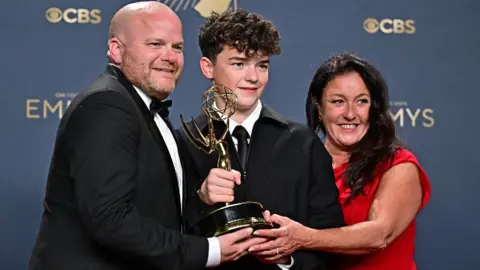 Getty Images
Getty ImagesMany truly great works of art over the years have been shot in one take – from World War One epic 1917 to the Spice Girls’ music video for Wannabe.
But a lot of the most famous examples – including that 90s girlband masterpiece – weren’t actually shot continuously in real life. They instead simply used some clever editing to made it look like they had been.
One of the many notable things about Netflix’s Adolescence, which has just won several top prizes at the Emmy Awards, was that all four of its hour-long episodes really did involve filming everything in one go, without interruption.
It’s a shooting technique which was widely praised for making the viewing experience more gripping and immersive when the series was released to huge acclaim in March.
Audiences were instantly drawn in to the show’s bracing depiction of a teenage boy who is accused of stabbing a female classmate. But the series was far more than another procedural crime drama.
Its exploration of the impact of smartphones and social media on teenagers captured the zeitgeist, tapping into the fears of parents around the world.

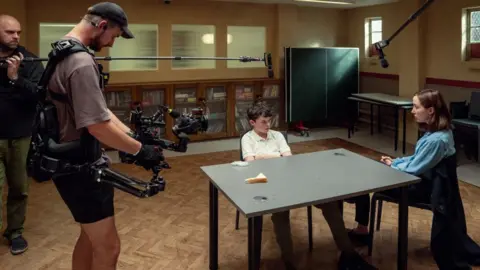 Netflix
NetflixThe drama’s breakout star was Owen Cooper, a Warrington-born actor who was only 14 when the series was filmed.
Cooper played the central character, Jamie Miller, a schoolboy who is abruptly woken up by the police storming his house in the show’s first episode.
They find him in his bedroom and place him under arrest. “You’re making a big mistake,” insists the boy’s dad, played by Stephen Graham, who also co-created the series with writer Jack Thorne.
But as the episode unfolds, it’s clear there is no mistake. Damning CCTV evidence ultimately proves Jamie’s guilt, and Adolescence begins to examine its key questions: what led to this murder, and what motive could a teenager possibly have had.
It was a storyline based on real events. “I read an article about a young boy who’d stabbed a young girl to death, and it made me feel cold,” Graham told Radio X’s Chris Moyles.
A similar but separate teen stabbing hit the headlines just a couple of months later. “And these two incidents were at the opposite ends of the country,” Graham noted.
“And I just thought, why is this happening? And not just because I’m a father, but I think any human being with a moral compass can look at that situation and think, what’s going on with society today that we’re in this era where these young boys are stabbing young girls to death?”

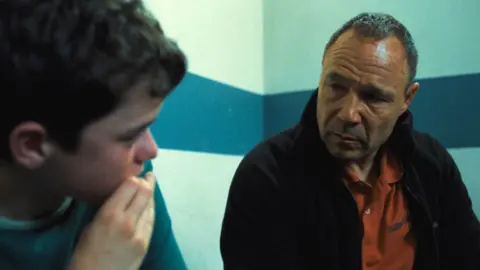 Netflix
NetflixGraham knew the success of the show would hinge on the young actor chosen to play Jamie, and casting director Shaheen Baig struck gold with Cooper – who had first become interested in acting around the age of 10.
In a joint interview with Baig, Cooper explained: “I don’t know where it came from, but I asked my mum and dad if I could start going to drama classes, and I think they were a bit shocked by it because I’ve always wanted to become a footballer.
“I still play football now, and then asking them if I wanted to start drama lessons, it was a bit out of the blue, really.”
Baig recalled: “It was really [about] trying to find somebody with the emotional register to be able to play Jamie.
“Owen sent us an improv tape, and I remember first watching that, and thinking, “OK. He looks great on camera, but also his improv was really smart.” It felt very natural.”

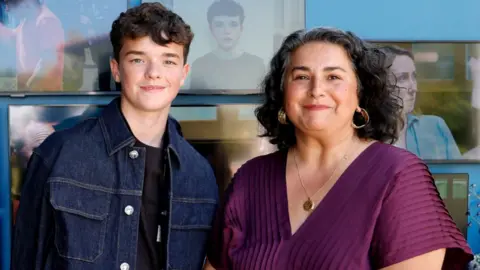 Getty Images
Getty ImagesMany of the headlines surrounding Cooper claimed he had never acted before. But that wasn’t actually true.
“It has frustrated us a bit,” said drama teacher Esther Morgan, who helped run the weekly acting classes Cooper had attended for two years in Didsbury, Manchester.
The Adolescence team, she told BBC News in April, had approached the Drama MOB school while casting the series, asking to see tapes of their “strongest northern boys”.
“They kept coming back for Owen,” she recalled. “He just had something.”
It was true that Cooper didn’t have any TV or film credits to his name, but not that he had never tried his hand at acting.
In fact, Morgan suggested Cooper’s comfort with one-take shooting was partly due to the drama school’s focus on improvisation.
When the show launched, Morgan said: “It felt amazing, but I didn’t realise it would be as good as it was, I didn’t expect it to be talked about so much.”
For several weeks, the series dominated the news agenda, and eventually went on to become Netflix’s second most watched English-language series ever (after the first season of Wednesday).
“We wanted to pose a question that got people talking on their sofas, in pubs, in schools, maybe even in parliament,” Thorne said.
The government subsequently supported Netflix’s proposal to make the drama available to schools. Prime Minister Sir Keir Starmer said there was a need to tackle the “emerging and growing problem” the show raised.
Many critics shared the sentiment in their reviews. “If you’re a parent to a school-age boy… it will chill your blood” said the Telegraph’s Anita Singh. It is a drama so quietly devastating that I won’t forget it for a very long time.”
Clearly, Emmy voters didn’t forget about it either. The show’s impact was so undeniable that it was seen as the dead-cert for best limited series.
Even Colin Farrell’s painful months spent in a hot and heavy bodysuit and under acres of prosthetics for Batman spin-off The Penguin were no match for it.
Adolescence’s victory this year continues Netflix’s winning streak, after another of their other watercooler hits, Baby Reindeer, took home several prizes in 2024.

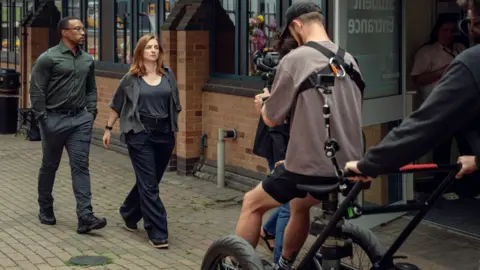 Netflix
NetflixAdolescence might have highlighted the dangers of social media – but its success also owes something to it.
Several scenes from the series went viral, from the initial arrest at the beginning to the camera that follows a pupil fleeing the classroom out of a window in episode two. Both moments were enhanced by the one-take shooting style.
“The choreography of camera and bodies, should you care to contemplate it, is remarkable, navigating crowds and corridors and public places with impossible grace,” noted the LA Times.
“Long, uninterrupted scenes also allow a superb cast to dive into character and the moment.”
But the show’s third episode, a chamber piece where Jamie spends an hour with a child psychologist, was perhaps the highlight. Hardly any other characters appear as Briony (played by Erin Doherty) gently probes Jamie.
Cooper runs the full acting gauntlet – veering from vulnerable to furious, cocky to distraught. Bearing in mind that Cooper only appears on screen in two of Adolescence’s four episodes, it was probably this performance which sealed his Emmy.

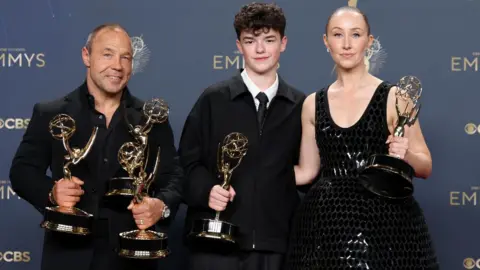 Getty Images
Getty ImagesBut the acting performances were praised across the board – with Doherty and Graham both winning for their respective roles, while the show also won awards for its writing and direction.
After filming Adolescence, Cooper said he had decided “that I’d do this happily for the rest of my life. I think Adolescence was the perfect start for me”.
“I think I did get very lucky to be a part of it,” he continued. “I just wanted to grab the opportunity with both hands. I went in there just wanting to learn. Wanting to do the job, really. And I’ll take that into every other job that I’ll ever, ever do.”
Much like Mr Bates vs. The Post Office a year earlier, Adolescence was not only successful, but had a real-world impact. It was one of those rare success stories that TV executives dream of.
You can expect Adolescence to continue its awards momentum into next year, at the Golden Globe, SAG, and Bafta TV Awards.
Cooper had better get his Emmys tuxedo back to the dry-cleaners.